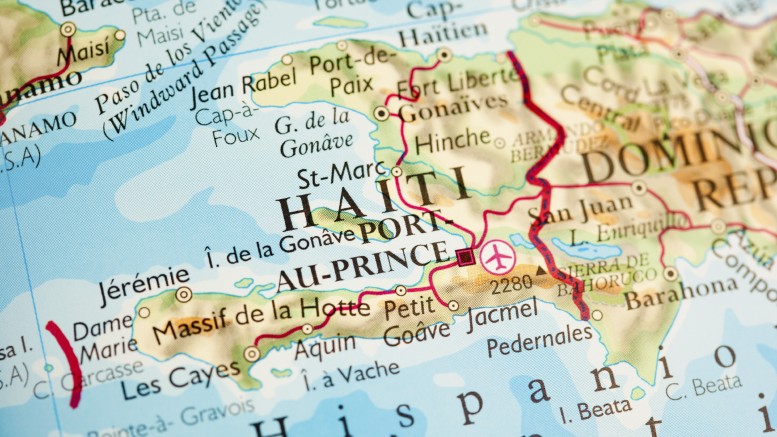Like the nose on your face, someone needs to be indicted for the mishandling of millions meant to bring Haiti into real-time. Of course, white bankers in the United States didn’t spend one-day in jail for the 2008 crash and trillions lost; but heck it sure must be good to be on top of the food chain.
By Don Allen, Publisher – Our Black News (Black History)
The Haitian Slave Revolution (1791-1804) was the largest and most successful slave rebellion in the Western Hemisphere. The revolt cost Haiti and it’s people to suffer generations of starvation, blight and rejection from the mainstream. Now, in 2015, more than five-years after the 2010 Haiti earthquake (catastrophic 7.0 magnitude), that destroyed most of the island’s infrastructure, Black Americans must come forward and ask, “What happened to the money rightfully belonging to the Haitian people for the earthquake recovery?” From the outside looking in, it seems that the legacy of slavery and the battle for freedom has evolved into a Jim Crow process, especially designed for our brothers and sisters in Haiti.
National Public Radio (NPR), the Public Broadcasting System (PBS) and NBC News have all covered (the best they can) stories about the money that seem to have disappeared from the face of the earth meant for the recovery efforts after the massive 2010 earthquake. While Haiti today is actually no better than it was before the 2009 quake; we (black Americans), must be more concerned with the white-male patriarchal system of checks and balances that keep the Haitian as slaves in “space.”
That “space” is a time frozen in history, trapped in a virtual downward spiral of filth, despair, hunger and homelessness exceeding the pre-2010 levels on the island. To look at the big picture, we need to look at some facts about what really happened to relief money:
- In late 2011, the Red Cross launched a multimillion-dollar project to transform the desperately poor area, which was hit hard by the earthquake that struck Haiti the year before. The main focus of the project — called LAMIKA, an acronym in Creole for “A Better Life in My Neighborhood” — was building hundreds of permanent homes. Today, not one home has been built in Campeche. Many residents live in shacks made of rusty sheet metal, without access to drinkable water, electricity or basic sanitation. When it rains, their homes flood and residents bail out mud and water. The Red Cross received an outpouring of donations after the quake, nearly half a billion dollars. (Source)
- The United Nations said that in total $13.34 billion has been earmarked for the crisis through 2020, though two years after the quake, less than half of that amount had actually been released, according to U.N. documents. The U.S. government has allocated $4 billion; $3 billion has already been spent, and the rest is dedicated to longer-term projects. Some global development analysts say that the spending structure — with the vast majority of money being funneled through foreign contractors instead of the Haitian government or local outfits — has built-in inefficiencies, compounded by a lack of accountability and transparency. (Source)
- So how much actually made it into Haiti? Even among the real money, if you look at what was labeled as humanitarian relief, in the months right after the quake that amounts to about $2.5 billion. Ninety-three percent of that money either went to United Nations agencies or international nongovernmental organizations, or it never left the donor government. So you had the Pentagon writing bills to the State Department to get reimbursed for having sent troops down to respond to the disaster. If we’re talking about reconstruction, it’s really a misnomer to think that relief aid was necessarily going to have the effect of rebuilding a country in any shape or form. (Source)
If you research the topic of Haiti and the aftermath of relief efforts, there is an ongoing resource of information that points to something sinister, wrapped in a silent malfeasance, covered up my major “sympathy agencies” who will shun any real questions about what is really happening to not threaten their board of directors, more importantly their funding base.
One thing for sure in the case of Haiti is that, yes, racism is rooted in it’s economic inequality; and mainstream society as a whole continues to use their customized best practices when it comes to different people, especially blacks. To this point, everyone from the president Obama to America’s black leadership has remained silent on Haiti. Of course with the United States police-problem, I guess focusing any attention on black folks in another country might be considered a waste of time.
If united we (blacks) stand; and divided we fall – from the global black perspective, black people in general have fallen, and continue to fall. If an earthquake on a tiny island full of black people cannot unite black people across the board, then what can? What will be the disaster black people need to see we need to problem-solve together and we cannot live without each other?
I’m just going to leave this here…

Be the first to comment on "Black Americans should be concerned about money that never made it to Haiti for earthquake recovery"